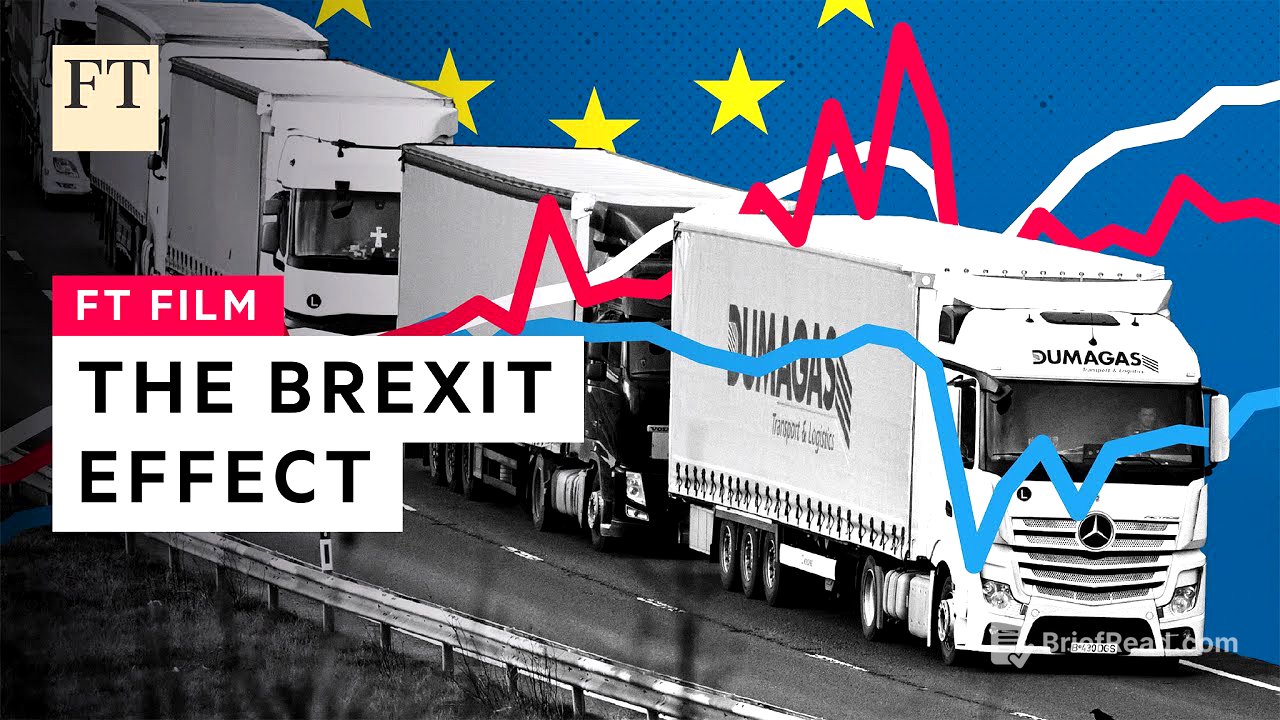TLDR;
This video from the Financial Times analyses the economic impact of Brexit on the UK, arguing it has led to economic self-harm through increased prices, reduced investment, and trade disruptions. It highlights a "conspiracy of silence" among politicians regarding Brexit's negative effects and examines the winners and losers, finding that the promised "Brexit dividend" has failed to materialise.
- Brexit has negatively impacted the UK economy, leading to increased prices, reduced investment, and trade disruptions.
- There is a "conspiracy of silence" among politicians regarding Brexit's negative effects.
- The promised "Brexit dividend" has failed to materialise.
The Brexit Effect [0:00]
The video begins by stating that the UK's decision to leave the European Union is an act of economic self-harm, impacting prices, investment and trade. These negative effects are attributed to Brexit rather than the pandemic or energy crisis. The hardest, least aligned version of Brexit was chosen, resulting in a bare-bones Free Trade Agreement. The true costs of Brexit are now emerging, although they have been masked by the Covid-19 pandemic and the crisis in Ukraine.
The Economic Impact [1:41]
The initial vote to leave the EU caused the pound to fall, making imports more expensive and raising inflation. This resulted in an immediate cost of approximately £870 per household. Brexit has increased freight costs and made dollar-denominated expenses more expensive for UK businesses. The recent mini-budget spooked the markets, causing Sterling to plummet and government borrowing costs to rise. Brexit's proponents often refuse to acknowledge its negative impact on the UK's economic performance.
Brexit and Business [4:40]
Businesses are struggling with increased bureaucracy due to Brexit. One organic tea company experienced significant delays in shipping to the EU, with an order to Italy being held up for 12 weeks. A jewellery business had to establish an entity in Europe to act as a master distributor, shifting business away from the UK. Exporting from the UK has become unviable for some businesses, leading them to move their European distribution to countries like Poland, resulting in fewer UK employees and reduced contributions to the UK economy. Smaller companies are finding it difficult to expand into European markets, and some European customers are avoiding UK suppliers due to Brexit-related complications.
Britain Falls Behind [9:45]
Since 2016, business investment has grown in all other G7 countries except the UK. Despite government efforts to stimulate investment, the brexit vote has caused business investment to plateau. This is concerning for the future of the UK economy, as investment drives capital and economic growth. The UK's trade recovery has been flat compared to other advanced economies, and the number of trade relationships between smaller UK companies and their EU counterparts has decreased.
The Labour Market [13:45]
British businesses have faced a recruitment crisis since leaving the EU, particularly in sectors like construction, hospitality, social care, and agriculture. The end of free movement has reshaped the economy, creating a painful period of adjustment for industries that relied on EU labour. The government's plan to develop a high-skilled, high-wage economy has been problematic, and some argue that cutting off the supply of cheap EU labour is beneficial in the long term.
Northern Ireland Conundrum [15:05]
The Northern Ireland Protocol, designed to avoid a border on the island of Ireland, has created a border in the Irish Sea and strained EU-UK relations. The EU is using the issue as a negotiating chip, blocking the UK from joining the Horizon Science research project. Despite the challenges, Northern Ireland has an incredible trading position, with access to both the UK and EU single markets, leading to economic success and inward investment.
The Conspiracy of Silence [16:50]
There is a political "conspiracy of silence" surrounding Brexit, spanning both the government and the Labour Party. It is difficult to separate the effects of Covid-19 and Brexit, and there is a reluctance to openly debate the economic consequences. Neither party wants to be honest about the trade-offs and challenges that Brexit presents. People are hesitant to discuss Brexit due to the divisions it has caused, hindering a necessary debate about how to make it function without distorting the economy.
Winners and Losers [18:57]
Some businesses that can produce goods for the UK market, which are now too complicated to import from the EU, may benefit from Brexit. EU-based companies and freight companies are also gaining business. However, younger people who voted against Brexit are among the losers, as they face travel and investment restrictions in Europe. The city of London has not seen the predicted doom, but there has been a slow relocation of business and people to other places.
The Brexit 'Dividend' [21:17]
The promised benefits of Brexit have not materialised, and the brexiteers have failed to formulate a cogent case for how it will lead to a better economy. Trade deals with countries like Australia are only marginally positive and do not compensate for the loss of frictionless trade with the EU. Attempts to outline a "Brexit dividend" have been unconvincing, and the idea that Brexit would unleash Britain's global potential is misleading. The vote leave side presented an optimistic view of the British economy after Brexit, including deregulation and global trade deals, but these have not been fully realised.









![This Crypto Crash Will NOT End Here! [Here's Why]](https://wm-img.halpindev.com/p-briefread_c-10_b-10/urlb/aHR0cDovL2ltZy55b3V0dWJlLmNvbS92aS9EbUdyNzlUemp4TS9ocWRlZmF1bHQuanBn.jpg)